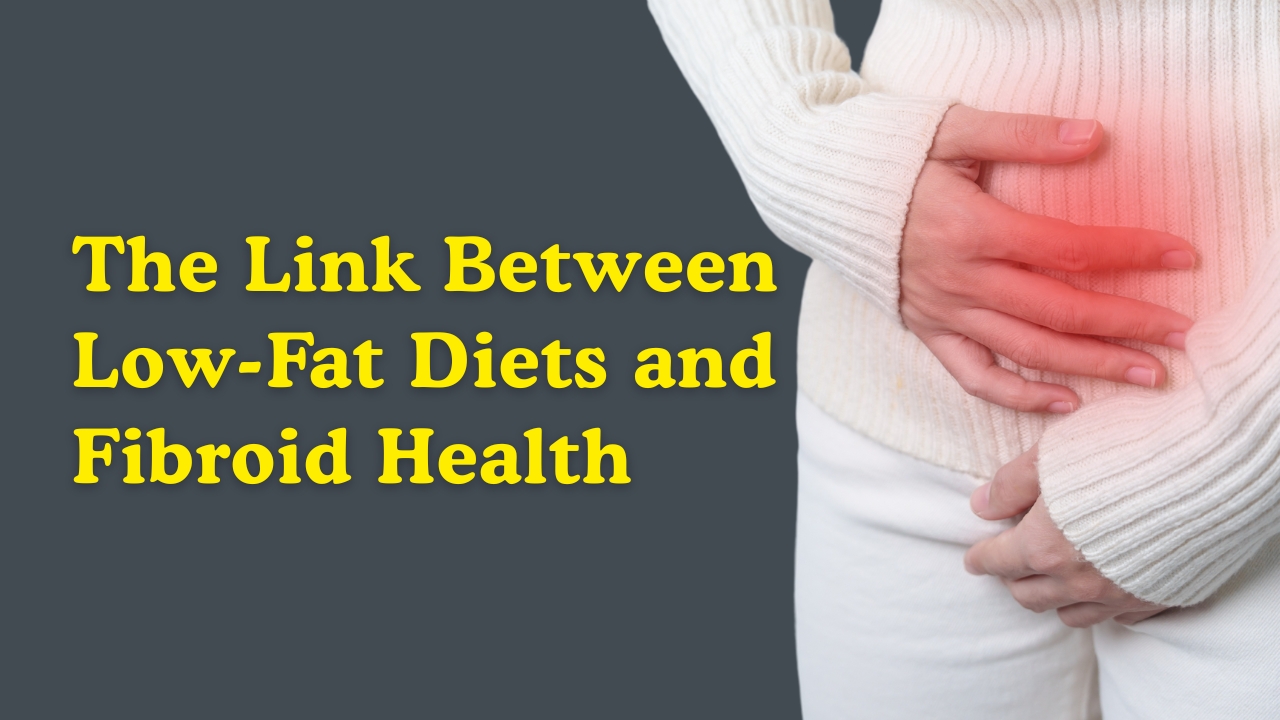Fibroids are a common yet often overlooked health concern, especially among women of reproductive age. These non-cancerous growths in the uterus can range in size and cause symptoms like heavy menstrual bleeding, pelvic pain, bloating, and even fertility challenges.
While medical and surgical treatments are available, many women are exploring the power of food as a natural tool to manage fibroids. Can what you fix on your plate help to fix your fibroids?
A low-fat, plant-forward way of eating.
Let’s dive into how what’s on your plate may impact fibroid growth—and whether a low-fat diet could be a helpful ally in your journey to hormonal and uterine health.
What Are Fibroids, and Why Do They Form?
Fibroids (also called uterine leiomyomas or myomas) are influenced largely by hormones—particularly estrogen and progesterone. These hormones fuel their growth, which is why fibroids tend to develop during a woman’s reproductive years and often shrink after menopause when hormone levels decline.
While genetics, race (fibroids are more common and severe in Black women), and other lifestyle factors play a role, diet may be an often-underestimated piece of the fibroid puzzle.
The Diet-Fibroid Connection
Emerging research suggests that dietary choices can influence fibroid development and growth. Specifically, a high intake of saturated fats (commonly found in red meat, full-fat dairy, and processed foods) has been associated with an increased risk of fibroids. On the flip side, plant-forward, lower-fat diets appear to offer protective benefits.
So, how might a low-fat diet help?
1. Lowering Estrogen Levels Naturally
Since fibroids are hormone-driven, reducing circulating estrogen levels can potentially slow their growth. High-fat diets—especially those high in animal fats—can raise estrogen levels in the body. Fat cells produce estrogen, so the more fat in the body, the higher the potential estrogen load. A low-fat, plant-based diet can support a healthier hormonal balance by decreasing overall fat intake and encouraging the body to excrete excess estrogen more efficiently.
2. Reducing Inflammation
Chronic inflammation is another contributing factor in fibroid growth. Diets high in trans fats, sugar, and processed meats can promote inflammation, whereas low-fat, whole-food, plant-based diets are rich in antioxidants and anti-inflammatory compounds. Leafy greens, berries, flaxseeds, turmeric, and legumes can all help soothe systemic inflammation.
3. Improving Insulin Sensitivity
Insulin resistance and elevated insulin levels are linked to fibroid development. A low-fat, high-fiber diet can help regulate blood sugar levels and improve insulin sensitivity. Stable blood sugar means fewer hormonal disruptions, which may reduce the likelihood of fibroid growth.
4. Promoting Healthy Weight Management
Excess weight is a known risk factor for fibroids. A low-fat diet, especially one that emphasizes whole, unprocessed plant foods, can support healthy and sustainable weight loss. As weight drops, so does the burden of estrogen from fat cells, further decreasing fibroid-promoting conditions in the body.
What About Soy? Clearing Up the Confusion
Soy often sparks debate when it comes to hormone-related conditions like fibroids because it contains phytoestrogens—plant-based compounds that can mimic the effects of estrogen in the body. Since fibroids are estrogen-sensitive, many people assume that soy could worsen them. But the truth is more nuanced.
What the Research Says:
Studies show that moderate intake of whole soy foods, such as edamame, tofu, tempeh, and unsweetened soy milk, does not increase fibroid growth. In fact, phytoestrogens may actually help regulate estrogen levels by blocking stronger, more harmful estrogens from binding to estrogen receptors.
In simpler terms, the mild estrogen-like effect of soy can compete with and reduce the activity of more potent natural or synthetic estrogens—a potential protective effect. Soy is also rich in fiber, antioxidants, and anti-inflammatory compounds, all of which support overall hormonal balance and reduce chronic disease risk.
Stick to Whole Soy Foods—and Don’t Overdo It
While moderate soy intake is generally considered safe, excessive consumption might contribute to hormonal imbalances and could potentially affect fibroid growth. Some studies suggest a possible link between high soy intake—especially when consumed in large amounts during infancy—and an increased risk of uterine fibroids later in life.
That’s why it’s best to focus on minimally processed soy foods in moderation:
- Tofu
- Tempeh
- Edamame
- Unsweetened soy milk
If you’re not allergic to soy and tolerate it well, incorporating moderate amounts into a balanced, low-fat, plant-forward diet may support fibroid health. Soy contains phytoestrogens, which can have both helpful and potentially harmful effects depending on your individual hormonal balance. As with most things in nutrition, more isn’t always better.
Before making soy a regular part of your routine, it’s a good idea to talk with your doctor, especially if you have a history of hormone-sensitive conditions.
🌱 Foods to Favor
If you’re looking to support fibroid health through nutrition, focusing on whole, nutrient-dense, and low-fat plant-based foods is a great place to start. These foods not only help balance hormones but also reduce inflammation, support liver detoxification, and promote overall well-being.
🍓 Fruits and Vegetables
Aim for a colorful variety every day. Brightly colored fruits and vegetables are rich in antioxidants, which help reduce oxidative stress and inflammation—both of which are linked to fibroid growth.
- Berries (like blueberries, raspberries, and strawberries) are packed with fiber and vitamin C, which supports immune function and collagen production.
- Leafy greens (like spinach, kale, and Swiss chard) are high in magnesium and iron—important nutrients for those experiencing heavy menstrual bleeding.
- Citrus fruits, especially oranges and grapefruits, may offer protective benefits against fibroids due to their high flavonoid content.
🌾 Whole Grains
Whole grains are high in fiber, which helps your body eliminate excess estrogen through the digestive system. They also help stabilize blood sugar levels, which is crucial for hormonal balance.
- Brown rice, quinoa, steel-cut oats, barley, and buckwheat are excellent choices.
- Swap out white rice and refined grains for these whole options to keep your hormone health on track.
🫘 Legumes
Legumes like black beans, chickpeas, lentils, and navy beans are rich in plant-based protein and fiber. They help keep you full, regulate insulin levels, and reduce the likelihood of hormonal spikes that could contribute to fibroid growth.
🌰 Flaxseeds and Chia Seeds
These super seeds are small but mighty.
- Flaxseeds contain lignans, plant compounds that may help block excess estrogen activity in the body.
- Chia seeds are rich in omega-3 fatty acids, which help reduce inflammation.
- Add a tablespoon to your smoothie, oatmeal, or homemade energy bites for an easy hormone-balancing boost.
🥦 Cruciferous Vegetables
Cruciferous veggies like broccoli, cauliflower, Brussels sprouts, cabbage, and bok choy support the liver’s natural detoxification process.
- These vegetables contain indole-3-carbinol, a compound that helps the body break down and eliminate excess estrogen.
- Lightly steaming or sautéing them makes them easier to digest while preserving nutrients.
🍠 Other Hormone-Friendly Additions
- Sweet potatoes provide complex carbs and vitamin A, supporting reproductive health.
- Turmeric has natural anti-inflammatory properties and may help regulate menstrual pain and inflammation.
- Green tea is rich in antioxidants like EGCG, which has been shown in some studies to inhibit fibroid cell growth.
🚫 Foods to Limit
To reduce fibroid risk and support hormonal health, try to minimize or eliminate these foods from your diet, especially if consumed regularly:
🥩 Red and Processed Meats
Diets high in red meat (like beef, pork, and lamb) and processed meats (like bacon, sausages, and deli meats) have been linked to increased fibroid risk. These meats may contain added hormones, nitrates, and inflammatory compounds that contribute to hormone imbalances.
🧀 Full-Fat Dairy Products
While some calcium is essential, full-fat dairy can be high in saturated fats and hormones. Opt for plant-based alternatives like almond, oat, or flax milk that are fortified with calcium and vitamin D, which support hormone regulation.
🍟 Fried and Ultra-Processed Foods
Foods such as chips, fried chicken, frozen dinners, and fast food are loaded with trans fats, additives, and preservatives. These ingredients can spike inflammation and disrupt blood sugar levels, which may negatively impact fibroid health.
🍬 Added Sugars and Refined Carbohydrates
Excess sugar and white flour products can lead to insulin resistance and chronic inflammation. Over time, this hormonal imbalance can contribute to fibroid growth.
- Watch out for sodas, pastries, white bread, and high-fructose corn syrup in processed snacks.
- Instead, sweeten naturally with fruit, dates, or maple syrup in moderation.
Final Thoughts
While diet alone may not eliminate fibroids, it can be a powerful part of a holistic fibroid management plan. Adopting a low-fat, whole-food, plant-based diet not only supports hormone regulation and reduces inflammation but also promotes overall well-being and vitality.
If you’re navigating fibroids and looking for natural, food-based strategies to feel your best, remember: every bite counts. Shifting toward a lower-fat, nutrient-rich plate could be a meaningful step toward taking back control of your health—one delicious meal at a time.
Ready to Learn More?
If you’re looking to create a personalized wellness roadmap to support hormonal balance and healthy aging, take the “How Well Are You Aging?” Quiz to find out where you stand—and get practical next steps for your health journey! 👉 Take the Quiz Now





